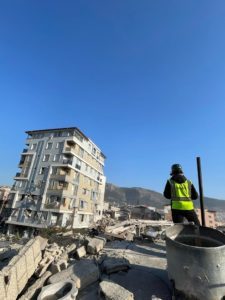image courtesy BRINC, used with permission
US Drone Manufacturer BRINC Drones Sends Drones and Pilots to Turkey
BRINC Chief of Staff Andrew Coté had arrived from Turkey only hours earlier when we met at the BRINC facility in Seattle, but the former Marine brought the same calm efficiency to our interview as he had in the previous days amid the post-earthquake devastation he found in the Hatay Province, as he and Chief Pilot Chase Bailey spent four days flying during all available daylight hours to search for survivors and remains.
BRINC Global Rescue Network
BRINC’s SWAT drones were created in the aftermath of the 2017 Las Vegas mass shooting – and the company has been committed to responding to emergencies ever since. The BRINC Global Rescue Network, the philanthropic arm of the organization, has been donated drones and services around the world. When the news of the earthquakes in Turkey and Syria hit, CEO Blake Resnick and Coté immediately decided the BRINC LEMUR could provide value, and that they would do what they could to contribute to the rescue efforts.
image courtesy BRINC, used with permission
It wasn’t that easy. “We immediately started thinking about any contacts we had in the region, reaching out to distributors and anyone we knew in the government to see if they had missions for us,” said Resnick. Coté has a significant network in the government and armed forces; the company is well known in special forces, law enforcement and first responder communities. Still, in the chaos following an emergency of epic proportions, finding an organization to embed with proved difficult.
If you missed the story of how BRINC provided drones and training to forces in Ukraine, the boldness of their next decision is unsurprising. “We knew conditions were getting worse and there would be less of an opportunity to find people the longer we waited, so we just decided to go,” said Resnick.
On the Ground in Turkey
Coté coordinated with contacts at the Turkish embassy in DC and Turkey’s version of FEMA, gaining letters of introduction and authorization. He and Chief Pilot Bailey equipped themselves with everything they would need for their own survival and maintenance when in Turkey, so they would require nothing except for water and power for the aircraft when they arrived. They prepared a translated statement of purpose to engage with key leaders and the community on the ground. They then deployed, with 3 LEMUR drones, to the Hatay region, the second hardest hit area, about 30 minutes west of the Syrian border.
Turkish Special Operations forces were in control of the city. Coté operated as his Marine training dictated, engaging with the key leader on the ground and explaining the capabilities of the BRINC equipment. The ground forces accepted their help immediately, providing a team of 3 soldiers to help them navigate and translate in the city.
image courtesy BRINC, used with permission
The condition of the area, said Coté, was as horrifying as images have indicated. “We categorize the buildings into 3 types: those that are completely destroyed, those that look intact but may not be safe, and the buildings in which the first and second floors have been compressed while the rest of the building remains intact.”
Their job was to search for survivors, or identify remains by navigating into damaged buildings with the LEMUR drones – designed to operate in GPS deprived environments, to break into buildings and clear areas for SWAT teams, and to establish 2-way communications. Applied to search and rescue after a disaster, the LEMUR is incredibly effective.
Survivors understood immediately what the team was trying to do, and were grateful for the opportunity. “Families were camped out in front of destroyed buildings, waiting for help to find their family members,” Coté explained. “Family members would tell us where to look – which apartment, which room – and we navigated where they told us too.” They flew for as long as possible each day for four days before flying back to Seattle.
The mission was difficult, and the experience for Coté and Bailey challenging. But as they returned to Seattle, they were already thinking forward to what will come next for survivors and first responders in Turkey.
“It’s going to get more dangerous, and more precarious for them,” said Coté. “It’s extremely challenging. Now, teams are bringing whole buildings down and then trying to identify remains.”
Miriam McNabb is the Editor-in-Chief of DRONELIFE and CEO of JobForDrones, a professional drone services marketplace, and a fascinated observer of the emerging drone industry and the regulatory environment for drones. Miriam has penned over 3,000 articles focused on the commercial drone space and is an international speaker and recognized figure in the industry. Miriam has a degree from the University of Chicago and over 20 years of experience in high tech sales and marketing for new technologies.
For drone industry consulting or writing, Email Miriam.
TWITTER:@spaldingbarker
Subscribe to DroneLife here.
https://dronelife.com/2023/02/26/brinc-in-turkey-responding-in-crisis/
